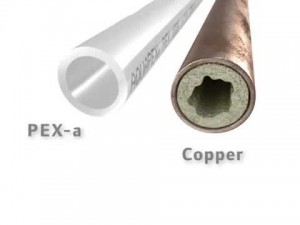What is Pex pipe and Copper pipe?
The usual conflict is pex pipes vs copper pipes as they are both found to be suitable in one way or another. Piping or for that matter, even re-piping is a tough job. It has to be properly and quickly done to avoid making a mess. Apart from the planning, tools and efficiency, the question of what pipes to be used always exists.
 Pex Pipe vs Copper Pipe Differences
Pex Pipe vs Copper Pipe Differences
The general differences between copper pipe and pex pipes are listed below:
Copper Pipes
|
Pex pipes
|
- Copper creates a perfect biostatic environment (It does not allow for the growth of bacteria inside pipes).
|
- Pex pipes are not as effective as copper pipes in this aspect.
|
- Corrosion resistance is offered by copper pipes. But to a large extent, it depends upon the pH level of water.
|
- Corrosion resistance is much better.
|
- Copper pipes can be used outdoors due to its UV resistance.
|
- Outdoor use is restricted due to its reduced UV resistance.
|
- Copper has high thermal conductivity. Though this is a favourable property in several applications, it is a problem for piping. It can lead to heat loss in hot/cold water.
|
- Heat loss is not a problem.
|
- In cold climates, as a result of its thermal conductivity, copper pipes cause water to freeze. Excess freezing exerts pressure on the pipes and causing them to burst.
|
- The pipe bursting problem does not occur with pex pipes.
|
- These need to be soldered and the best is to practice using a vise before practically attempting to use them.
|
- These are easy to handle and fit. Hence, they are more preferred for small level indoor piping.
|
- Copper pipes are expensive with prices up to 10 times that of its pex counterparts.
|
|
- Recycling can be considered with these pipes.
|
- The lifespan of these pipes is relatively short and hence, recycling is not considered as an option.
|
 Pex Pipe vs Copper Pipe Differences
Pex Pipe vs Copper Pipe Differences